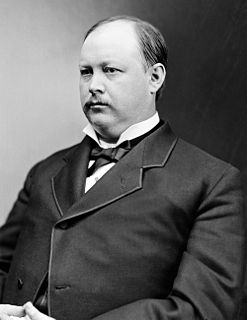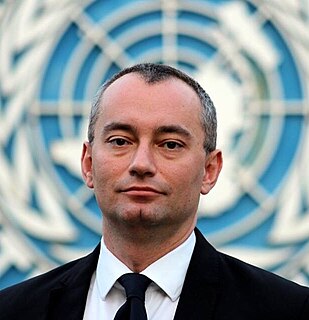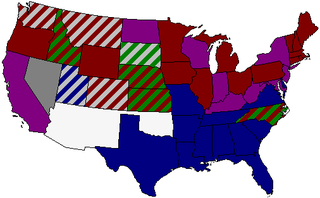
The politics of Bulgaria take place in a framework of a parliamentary representative democratic republic, whereby the Prime minister is the head of government, and of a multi-party system. Executive power is exercised by the government. Legislative power is vested in both the government and the National Assembly. The Judiciary is independent of the executive and the legislature.

The Bulgarian Socialist Party, known as the Centenarian, is a social-democratic political party in Bulgaria and the successor to the Bulgarian Communist Party. It is a member of the Party of European Socialists with a pro-EU stance, although it has taken some euroskeptic positions and called for an end to EU sanctions against Russia. BSP is also a member of the Socialist International. It is Bulgaria's largest political party by membership.

The Union of Democratic Forces is a political party in Bulgaria, founded in 1989 as a union of several political organizations in opposition to the communist government. The Union was transformed into a single unified party with the same name. The SDS is a member of the European People's Party (EPP). In the 1990s the party had the largest membership in the country, with one million members, but has since splintered into a number of small parties totaling no more than 40,000 members. The SDS proper had 12,000 members in 2016.

Bulgaria elects on national level a head of state - the president - and a legislature. The president is elected for a five-year term directly by the people. The National Assembly has 240 members, elected for a four-year term by proportional representation in multi-seat constituencies with a 4% threshold. Bulgaria has a multi-party system, in which no one party often has a chance of gaining power alone, and parties must work with each to form governments.

Elections to the United States House of Representatives were held in 1896 for members of the 55th Congress, coinciding with the election of President William McKinley.
The Democratic Party is a center-right party in Bulgaria led by Alexander Pramatarski. The party is a member of the European People's Party (EPP).

The History of Bulgaria since 1990 is the period of Bulgarian history that begins after the fall of Communism and the transition to Capitalism.

The 1896 South Carolina gubernatorial election was held on November 3, 1896 to select the governor of the state of South Carolina. William Haselden Ellerbe won the Democratic primary and easily won the general election to become the 86th governor of South Carolina.

Bulgaria elected its members of the European Parliament in a by-election on 20 May 2007. It was the country's first European election, having joined the Union on 1 January of that year. The country still had 18 MEPs, no change from before the election. Until Bulgaria could hold these elections, the country was represented by MEPs appointed by the National Assembly.

GERB is a conservative, populist Bulgarian political party established on 13 March 2006. The initials of the party герб/gerb also translate as "coat of arms" in Bulgarian. It is Bulgaria's second-largest party by membership.

The European Parliament election of 2009 in Bulgaria was held on Sunday 7 June 2009 and was the election of the delegation from Bulgaria to the European Parliament. As a result of the Treaty of Nice – that became active in November 2004 – the number of Bulgarian delegates in the European Parliament decreased from 18 to 17 delegates. When the Treaty of Lisbon was ratified, the number of Bulgarian Delegates went back up to 18.

The Greens are a green Bulgarian political party founded in 2008.

The United States Senate elections of 1896 and 1897 were elections in which the Democratic Party lost seven seats in the United States Senate, mostly to smaller third parties.

The Liberal Party was a political party in Bulgaria and the main force in domestic politics between independence in 1878 and the mid-1880s when it dissolved into several different factions.

The National Liberal Party was a political party in Bulgaria.

Parliamentary elections were held in Bulgaria on 5 October 2014 to elect the 43rd National Assembly. GERB remained the largest party, winning 84 of the 240 seats with around a third of the vote. A total of eight parties won seats, the first time since the beginning of democratic elections in 1990 that more than seven parties entered parliament. Boyko Borisov then became prime minister as head of a coalition with the Reformist Bloc and with outside support from the Patriotic Front and the Alternative for Bulgarian Revival.

Local elections were held in all municipalities in Bulgaria on 25 October 2015 and on 1 November 2015. Voters elected municipal mayors, village mayors and members of municipal councils of 265 municipalities. They were held alongside a referendum on the electoral code.

Parliamentary elections were held in Bulgaria on 26 March 2017. They had originally been scheduled for 2018 at the end of the four-year term of the National Assembly. However, following the resignation of Prime Minister Boyko Borisov and the failure of Bulgarian parties to form a government, early elections were called. Borisov resigned following the defeat of Tsetska Tsacheva, the candidate of his GERB party, in the November 2016 presidential elections. The official election campaign began on 24 February.
The 1896 United Kingdom local elections took place in late 1896 for municipal councils, as well as Rural districts. Municipal elections were held across England and Wales on Monday 2 November, with Scotland holding municipal elections the following day. Municipal elections in Ireland took place later that month, on Wednesday 25 November.












